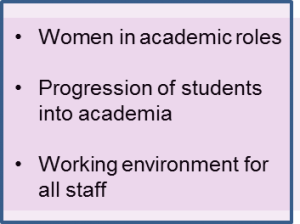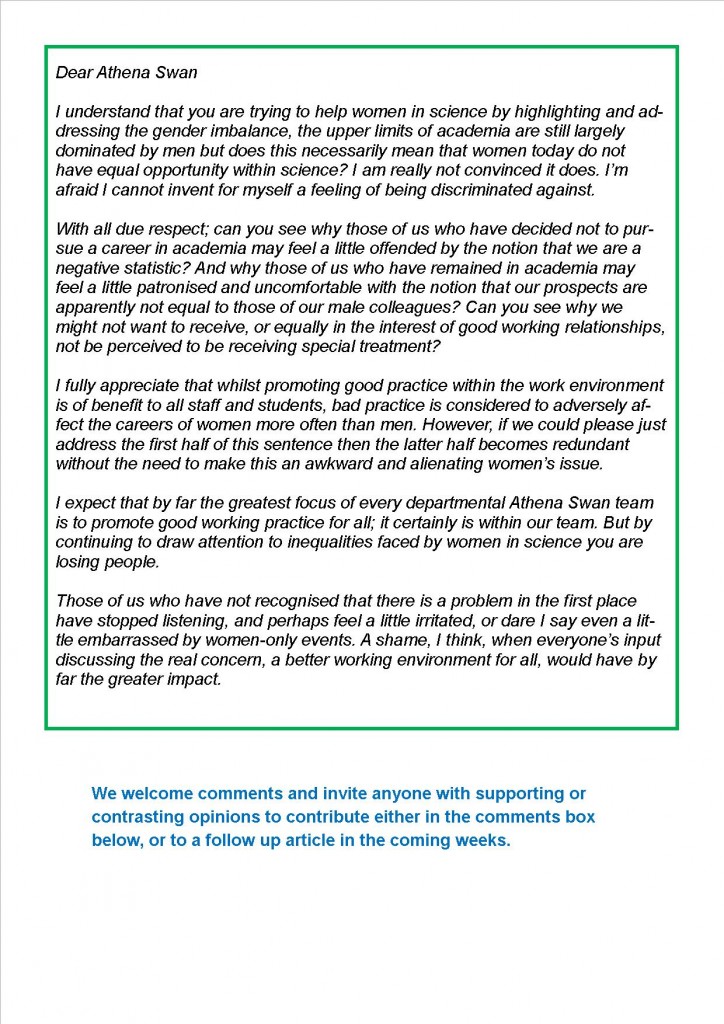In the second of today’s dual posts, we hear from Nancy Rios, Athena SWAN project officer for Newcastle University’s Faculty of Medical Sciences. Nancy explains why Athena SWAN is necessary, and how ICaMB aims to change its gender imbalance.
Athena SWAN – so what’s it all about? According to the tin, Athena SWAN is a charter set  up by women’s networks to tackle the under-representation of women in STEMM. The model is simple – we analyse our local situation, evaluate our working practices and then develop strategies and actions to make the workplace fairer for everyone. Universities and their departments can apply for either a Bronze, Silver or Gold award (renewable every three years). ICaMB has recently been awarded a Bronze award. So far, so good.
up by women’s networks to tackle the under-representation of women in STEMM. The model is simple – we analyse our local situation, evaluate our working practices and then develop strategies and actions to make the workplace fairer for everyone. Universities and their departments can apply for either a Bronze, Silver or Gold award (renewable every three years). ICaMB has recently been awarded a Bronze award. So far, so good.
Why Athena SWAN? Let’s start with the evidence.
In FMS, around 60% of undergraduate students are women.

In ICAMB, approximately 50% of PhD students, 40% of Postdocs, 50% of Fellows and 15% of permanent academic staff, including only 10% of Professors, are women.


These numbers aren’t unusual. In fact the alarming drop out rate and low proportion of women in senior, strategic positions is typical in STEMM departments in universities all over the country. So there’s the statistical evidence – women scientists aren’t progressing in academia at the same rate as men.
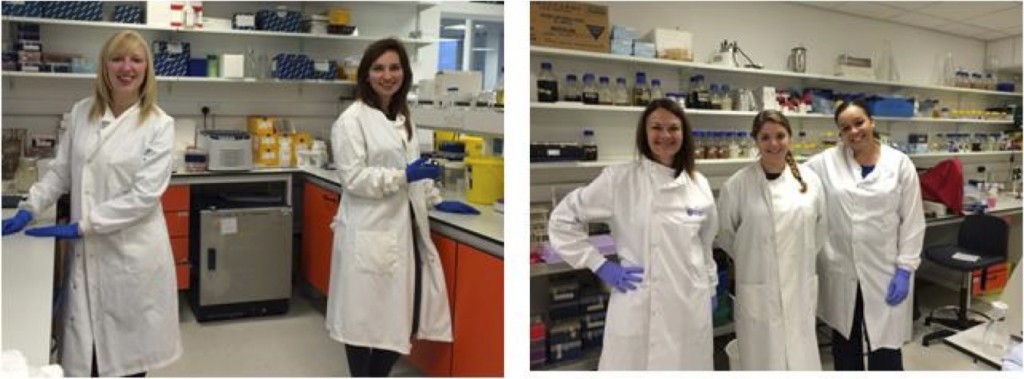 So why does all this matter? Why make gender equality something that should be addressed in our workplace? Being concerned about the loss of women scientists isn’t about being politically correct and nor is it about feminism. Athena SWAN is about developing a competitive and effective workplace and making the most of all of our talent for the benefit of the University and for science. It’s about becoming a modern and dynamic employer that understands that women and men both become parents or carers and both make great scientists. Quality needs diversity. Recent research shows that teams and boards that include women make better decisions and perform better in business. That’s why diversity is a priority for our university.
So why does all this matter? Why make gender equality something that should be addressed in our workplace? Being concerned about the loss of women scientists isn’t about being politically correct and nor is it about feminism. Athena SWAN is about developing a competitive and effective workplace and making the most of all of our talent for the benefit of the University and for science. It’s about becoming a modern and dynamic employer that understands that women and men both become parents or carers and both make great scientists. Quality needs diversity. Recent research shows that teams and boards that include women make better decisions and perform better in business. That’s why diversity is a priority for our university.
OK, but why are so many women leaving? Maybe women just don’t want to stay in science. You can’t chain anyone to a bench and why would you want to? Actually, when you look at the evidence, the reasons that women leave are varied and complex. They lie in a combination of structural, cultural and systemic factors, both conscious and unconscious bias. Biology is a factor too, of course. Even though parental responsibilities can be shared, adding to the family just does have more immediate impact on the mother.
Bias may be a dirty word, but if we pretend it isn’t happening, we can’t do anything about it. In a very recent and rather hair-raising example of blatant bias a peer-reviewer suggested two female biologists get a man to co-author their paper to improve it. Another more local example came from a researcher who was asked at a job interview (at a different university) whether or not she was planning children. She said she wasn’t, and the panel asked her how she knew. There is also the less obvious unconscious bias that we all inevitably have. Unconscious bias means that our behaviours and the decisions that we make are influenced without our knowing it by preconceptions that we’ve been developing since birth. Our brains develop short cuts that cause us to make assumptions and ignore objective facts. These shortcuts are natural and necessary for survival, but they are not so good for business. Evidence would suggest that unconscious bias can have an impact at work at any level you care to think about.
For example Moss-Racusin et al, 2012, found that professors (of both genders) when evaluating applications from students for a post of lab manager rated the ‘male’ applicant more competent and hirable, and offered a higher starting salary, than that of an otherwise identical ‘female’ applicant.
A 2014 study showed that when students were asked to rate teaching instructors of online courses they rated the male identity significantly higher than the female identity regardless of the actual gender.
And this bias can make a difference to which students are encouraged or ignored, who is asked to present group data at conferences or who is asked to make the tea. Biases can also make a difference to how much we feel we can achieve for ourselves.
There are also structural factors that can impact women more than men – out of date procedures and systems that make it hard to balance working with family life. For example, it tends to be more difficult for women to engage in networking opportunities, meetings and seminars after hours. Short term contracts, working abroad, travel, a ‘long hours’ culture and few opportunities to work part time are difficult for both men and women who have children or other dependants to look after.
It’s great to hear that researchers like Suzanne do not feel that they have personally experienced any discrimination. Unfortunately less positive accounts of women’s experiences at work are frequently heard. For example the PhD student who loved her field but wasn’t planning on staying beyond until her late twenties because she wanted to have a family and saw this as incompatible; an academic who got ill to the point where she was on medication trying to manage the transition back to work after maternity leave – she ‘didn’t dare’ ask for help; a professor in her 50s who pondered over whether the sacrifice she’d made twenty years earlier – she decided not to have children, in order to pursue her career – was really the right decision. There are accounts of bullying (gender related), discrimination (gender related) and resignation (in all senses of the word).
So what can Athena SWAN do?
 In ICAMB, we’re using the Athena SWAN process to try and redress the balance and work towards a fairer workplace for all. For example, we looked at the first big attrition point for us – the transition from Postdoc to Lecturer. We found out that mentors were generally only available to Postdocs with fellowships, so we set up mentoring schemes to enable all Postdocs in FMS to access a mentor. We found that both women and men were unaware of what support they were entitled to around maternity and paternity leave and flexible working, so we’ve made an effort to highlight and publicise policies. We’ve committed to ensuring that all staff involved in recruitment panels attend training in unconscious bias. We provide additional time and money to support staff to attend training courses. We’ve started holding seminars at different times and we organise ‘equality in academia’ events. We are also engaging with national projects such as Soapbox Science.
In ICAMB, we’re using the Athena SWAN process to try and redress the balance and work towards a fairer workplace for all. For example, we looked at the first big attrition point for us – the transition from Postdoc to Lecturer. We found out that mentors were generally only available to Postdocs with fellowships, so we set up mentoring schemes to enable all Postdocs in FMS to access a mentor. We found that both women and men were unaware of what support they were entitled to around maternity and paternity leave and flexible working, so we’ve made an effort to highlight and publicise policies. We’ve committed to ensuring that all staff involved in recruitment panels attend training in unconscious bias. We provide additional time and money to support staff to attend training courses. We’ve started holding seminars at different times and we organise ‘equality in academia’ events. We are also engaging with national projects such as Soapbox Science.
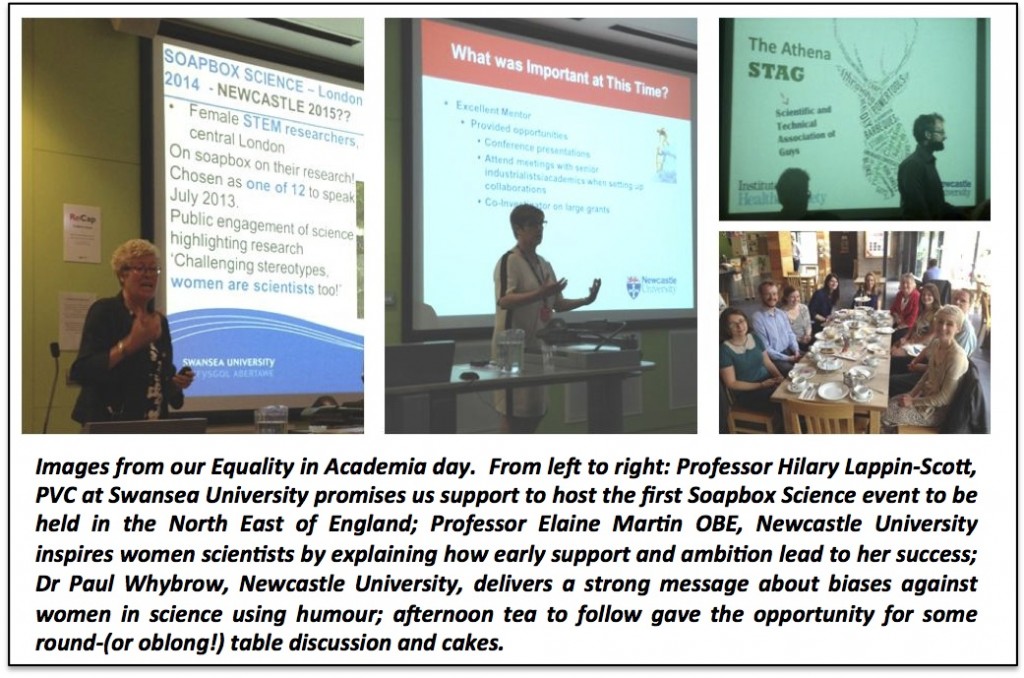
We are working with colleagues across FMS and the University on Athena SWAN. We are lobbying the University to provide a nursery with affordable creche provision for all staff. We’ve heard that many women have found it very difficult when returning from maternity leave to get their research back up to speed – so we’re in the process of setting up a programme that will offer research active staff (men and women) additional support at that time to make a successful transition back to a research career.
These are just a few of the small changes that we’ve started to make under Athena SWAN to make the workplace fairer for everyone, but it’s just the start of a journey. There are a plethora of other issues that are emerging that people are asking us to think about. What’s going on with our recruitment procedures that means we sometimes have so few women applying? How can people gain experience on committees? Can we simplify and update our policy around bringing children into the workplace in a fair but sensible way?
You may have noticed that the vast majority of actions benefit men as well as women, and  there are changes that have a positive impact on everyone. That is why it is so important to get as many people as possible involved. We would love to have more volunteers on our Athena SWAN team to help out with input, ideas and challenges and help us achieve a Silver Award in the near future! Culture change is difficult and it’s inevitable that we won’t always get things right first time, so the more feedback we get, the better.
there are changes that have a positive impact on everyone. That is why it is so important to get as many people as possible involved. We would love to have more volunteers on our Athena SWAN team to help out with input, ideas and challenges and help us achieve a Silver Award in the near future! Culture change is difficult and it’s inevitable that we won’t always get things right first time, so the more feedback we get, the better.
It’s concerning that Athena SWAN is so often misunderstood. There are ‘urban myths’ that it is about positive discrimination and giving women a ‘leg up’ the career ladder. If you think about it, this view is insulting to everyone. Let’s use the analogy of a footbal game – this isn’t about giving any player an advantage over another, its simply about levelling the pitch. We welcome an open discussion of the issues, of all the things that have been achieved so far and how they can be taken further.
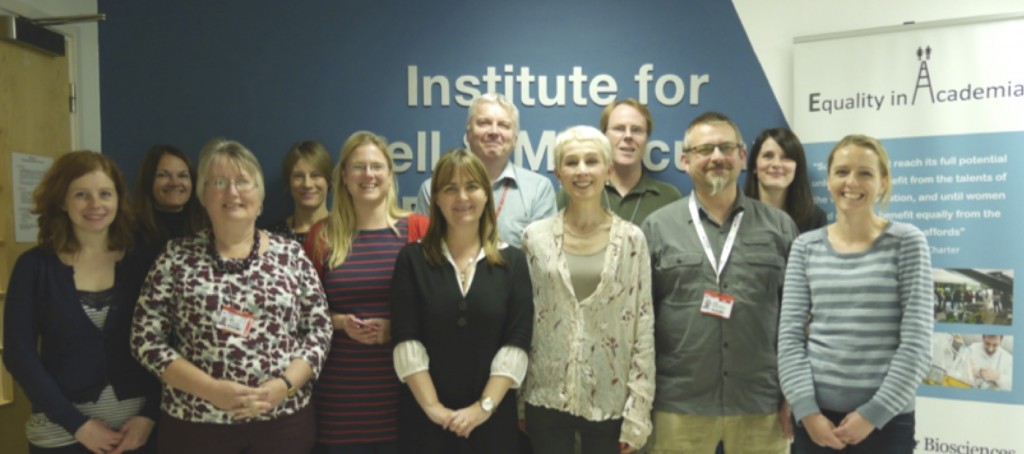
Links
https://heidi.hesa.ac.uk/
http://news.sciencemag.org/scientific-community/2015/04/sexist-peer-review-elicits-furious-twitter-response
Moss-Racusin et al, 2012: http://www.pnas.org/content/109/41/16474
Online course rating: http://link.springer.com/article/10.1007%2Fs10755-014-9313-4
Soapbox Science: http://soapboxscience.org/


